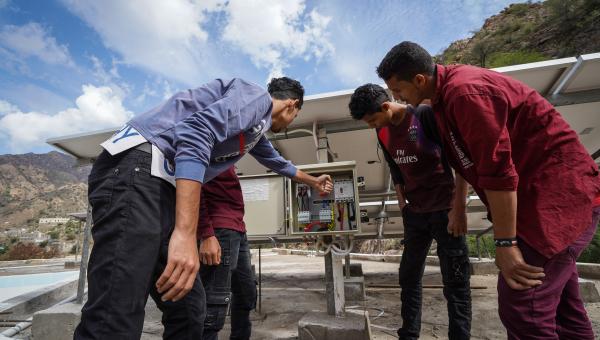
Focus Area
Green Economic Recovery and Development
Challenges in Yemen
Yemen protracted conflict has led to an unprecedented humanitarian crisis and further deterioration of an already alarming pre-existing context of community vulnerability and fragility – altering the country’s development trajectory. It has and is continuing to thrust vulnerable Yemenis into poverty and hunger – devastating the country’s economy, leaving many food-insecure without opportunities and access to basic services or decent work, and making Yemen one of the worst unequal countries in the world. The remarkable resilience of the Yemeni people that withstood underdevelopment for decades has lately stretched beyond its coping mechanisms.
The conflict’s continuation has increased food insecurity, community vulnerability and fragility. As communities continue to struggle with the daily challenges of access to income, food, health, and other key services, coping mechanisms and any saved funds or assets are being depleted. This is leaving communities in an ever-deepening spiral of poverty and food insecurity with very little hope to restore their livelihoods and assets once again. Furthermore, rising inequality, lack of opportunity, discrimination, and exclusion will further fuel grievances and perceptions of injustice as well as management of resources.
Responding to crisis
UNDP Yemen’s Economic Recovery and Development (ERD) programme is future looking. Not only does UNDP respond to urgent needs of the most vulnerable Yemenis, but it also helps to restore income sources, rehabilitates infrastructures and productive assets, and equips communities to overcome future challenges while preparing them for eventual long-term development.
UNDP’s ERD is implementing projects to help limit the impact of multiple crises by creating livelihoods and income-generating opportunities that enable homes and war-affected vulnerable people including internally displaced people (IDPs), women and youth to purchase basic needs (e.g., food, healthcare, clothing, and water). This while also rehabilitating essential community assets and infrastructure to provide access to key socio-economic services and stimulating the economy.
Crisis affected people are supported to access job opportunities and enable households to purchase basic necessities like food and water; enable resumption of priority services like hospitals, markets and schools; provide skills to vulnerable groups so that they can be employed; and assist micro-finance institutions to give financial support to their clients.
With growing demand for green energy sources, UNDP Yemen offers solar power solutions for services in sectors such as health, water and sanitation and education, as well as for livelihood initiatives. UNDP’s ERD helps Yemen build the energy sector back better, promoting a renewable energy mixture for recovery and development.
UNDP Yemen also helps improve nutrition and health conditions of children and lactating and pregnant women through conditional cash assistance and nutrition education.
Our Interventions
The Green Economic Recovery and Development programme portfolio is inter-related and complementary, essential to economic resilience and recovery. Together, projects contribute to income-generation, rehabilitation of productive assets and infrastructures, access to immediate and longer income opportunities, community resilience building, access to energy and service restoration. They are designed to foster communities be more inclusive and able to better manage shocks and future risks.
UNDP Yemen has scaled up the emergency crisis response and rural community resilience building through a bottom-up approach that works with local systems to boost capacities of the institutions to progressively resume and scale-up services delivery. The expanded programmes aim to mitigate impact of the multiple crisis through:
- Restoring livelihoods
- Rehabilitating productive assets
- Enhancing service delivery
- Improving access to finance and markets
- Empowering communities
- Empowering women
- Enhancing energy resilience
All projects
More

 Locations
Locations








